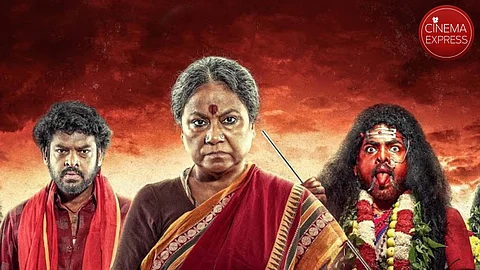

Om Kali Jai Kali is the latest addition to the list of web series that blends crime with supernatural elements centred around a temple festival. There is nothing inherently wrong with this trend, but the indiscriminate usage of this trope seems to be a trend-chasing aesthetic choice more than anything else. The Kulasekarapattinam Mutharamman Temple Dasara festival portrayal works only as a diversion to some divine occurrence at play rather than contributing meaningfully to the screenplay. The makers should have instead focused on the world-building around Barani (Pavan), AJ (Kiran DRK), and his disgruntled brother Rajadurai (Manikandan R Achari). The power tussle between them showed promise but was unforgivably skewed, making JioHotstar's Om Kali Jai Kali a series that is neither here nor there.
Director: Ramu Chellappa
Cast: Vemal, Ganja Karuppu, Queency, Pavan, Seema Biswas, Kiran DRK, Manikandan R Achari
The series, directed by Ramu Chellappa, begins in Tirunelveli's Vanadesam, which is gearing up for the pidari poojai, where Ganesan (Vemal) and Vakeel (Ganja Karuppu) prepare for the Saami aattam, adorned like the goddess. Moments later, we see a helpless Neela (Queency) running for her life to escape from an honour-killing-like situation. Vanadesam gives her refuge without questioning her background. As the years pass, an attempt on Neela's life forces her to reveal who she is and why she sought refuge in this village. The events that follow form the rest of the story.
The series gets the casting right, with an exceptional Vemal and Seema Biswas. Aptly named Kaathadi (Kite in Tamil), Seema shifts direction wherever the wind blows. She drives the plot when AJ, still miffed over his sister's 'betrayal' of running away with her lover, cannot tolerate his brother using her as bait to curry favours with the local MLA Barani, who is also looking to win another term. When Kaathadi switches sides to support Ganesan after enduring a personal loss, she becomes pivotal in plotting the revenge plan with a group of ordinary villagers. The lack of depth in Ganesan’s character would have been a drawback had Vemal not engaged us with his performance, capturing his losses and spirit of vengeance. Similarly, Kumaravel's Thamburan, an ambitious politician chasing the MLA ticket, is effectively sneaky. With Barani’s loyalists AJ and Rajadurai vying for an election opportunity, Thamburan manipulates both inner circles, provoking their animosity to clear his way. The antagonists, full of undesirable traits, make it easy for us to root for their downfall. Their characters required more insight, which we might have gotten if not for the makers' insistence on adding an otherworldly effect to the narrative.
Similarly, the use of local dialect in the dialogues is commendable. Thanks to the team's meticulous research into Kanniyakumari and Tirunelveli dialects, we are spared the usual overuse of 'ley' that often plagues films set in southern Tamil Nadu. As the narration shifts back and forth between Nagercoil and Tirunelveli, confusion about the setting could have arisen, but the dialects help distinguish the two locations clearly. It is refreshing to witness and appreciate the beauty and diversity of the Tamil language, as the series offers a welcome break from the artificiality of 'cinematic Tamil.'
On the downside, the narration falters when it tries too hard to convince us that a divine force orchestrates everything. Be it Mookan’s (Pugazh) foreign job dream, for which he takes a vow of abstinence, the death of RS Sivaji’s Koothar, or the subsequent events, none justify either a natural sequence of events or a divine miracle. The Saami aattam and the extensive Dasara sequence were employed merely to fill the frame with vibrant colours and create a sense of urgency as characters rush through the crowd. Beyond that, the festival or deity does not serve justice as seen in classic Amman films. Those with financial troubles still struggle, those seeking a life partner remain loveless, and those supposedly under divine protection remain vulnerable.
Om Kali Jai Kali shines in parts, thanks to strong performances, promising characters, and authentic dialect usage, but falters in integrating supernatural elements into the narrative. The portrayal of the Dasara festival feels ornamental, and the power struggle between Barani, AJ, and Rajadurai remains underdeveloped. Despite some engaging moments, the series struggles to balance its rural revenge plot with divine undertones, making it neither fully immersive nor impactful.